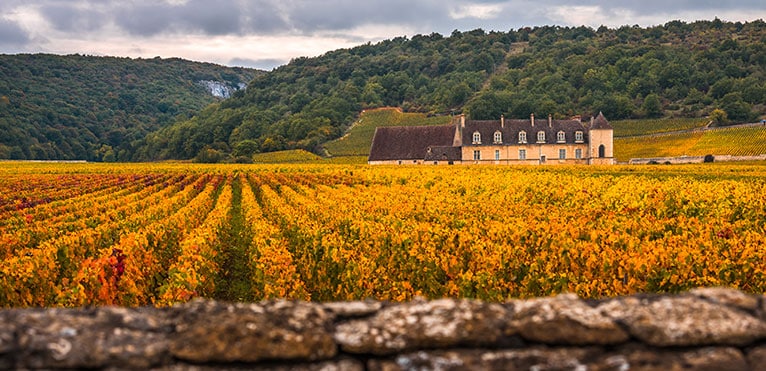
Contents
Volnay is a wine appellation located in Burgundy, a world-renowned wine region in central-eastern France. The region boasts eighty-four appellations with the French AOC (Appellation d’Origine Contrôlée) label, including Volnay. The vineyard has built its reputation on the production of high-quality red wine. It’s also worth noting that twenty-nine vineyard plots on the Volnay terroir are classified as Premier Cru.
Volnay, an appellation in turmoil
The vineyard’s history is tumultuous, to say the least. In fact, we now know that in 92 A.D., Emperor Domitian ordered the uprooting of the surplus vines beyond the gates of Italy. In the Middle Ages, the abbey of Cîteaux expanded and began to cultivate vines in the Côte-d’Or department. At the same time, the cultivation of Gamay and Pinot improved. However, from the 19th century to the 21st, the vines had to face three torments: phylloxera and mildew, two vine diseases, and a heatwave in 2003 that forced the uprooting of many vines.
A variety of soils for AOC Volnay
In terms of surface area, Volnay’s vineyards cover a total of 213 hectares, 126 of which are classified as Premier Cru. The plots are located at an altitude of between 230 and 280 meters. The climate in this geographical area is temperate to continental. In fact, the seasons are rather dry thanks to good exposure to the sun and moderate rainfall (732 millimeters per year). The average annual temperature is 10.5°C. In addition, cultivated land is located on southeast-facing slopes. The slopes are narrow and steep, providing ideal drainage for the vines. Soils are relatively varied, with three main types. At the top of the slope, we find white Argovian limestone, in the middle of the slope Bathonian limestone and, in the deeper soils, we move on to a layer of ferruginous Oolite which gives a more clayey soil.
Volnay is a real seducer
Volnay vineyards are almost exclusively planted with Pinot noir N grapes. Regulations authorize blending with Chardonnay B, Pinot blanc B and Pinot gris G in very small quantities. Wines from this appellation are bright red to dark garnet, with an eye-catching brilliance. Ruby flames can often be seen. Light, fresh aromas emanate from these wines. Floral and vegetal notes such as rose and violet are recognizable. When aired, the wines offer fine notes of red fruit: raspberry, redcurrant, and black fruit such as blackberry. As for the palate, it’s light and fruity, which appeals to many wine lovers. As a general rule, Volnay Premier Cru tends to be more concentrated and elegant than Volnay, although these tendencies vary greatly from year to year and from estate to estate. The appellation’s ageing potential ranges from five to fifteen years.
Volnay goes perfectly with meat
Volnay is a dry red wine. It will naturally enhance sophisticated dishes based on slow-roasted or glazed poultry. In addition, game birds simply roasted or slowly braised will also be exquisite accompanied by a glass of Volnay. And pairing Volnay with a hearty couscous will delight your taste buds, as will pairing it with a meat or poultry tagine. This appellation is best enjoyed at a temperature of between 14 and 16°C.
Volnay boasts many great vintages
As for the best vintages, the Crus du siècle are: 1928, 1929, 1937, 1947, 1978 and 2005. As for the Crus du Millénaire, we note the years 1945, 1949 and 1959.
Respect for the environment at the heart of the Volnay terroir
Domaine de La Pousse D’or
Today, Domaine de La Pousse d’Or stands out for its five grands crus and eleven premiers crus, including three monopoles, in the Côte de Beaune and Côte de Nuits regions. At present, the estate covers a total of 17 hectares of vines in the following villages: Volnay, Chambolle-Musigny, Corton, Pommard, Puligny-Montrachet, Morey-Saint-Denis and Santenay. Work in the vineyard and cellar is carried out according to biodynamic principles.
Domaine Joseph Voillot
The Joseph Voillot estate is located in the village of Volnay. This Volnay estate covers a total of 8 hectares of vines, with plots in the communes of Meursault, Volnay, Pommard and Beaune. This is a traditional, family-run operation. Today, Joseph’s grandson, Etienne Chaix, runs the Joseph Voillot estate. Each plot on the estate is harvested exclusively by hand by around sixty people, mostly from the Voillot family and friends. Preserving the environment is an extremely important value for Etienne Chaix, which is why the farm uses integrated farming methods and has received High Environmental Value certification.